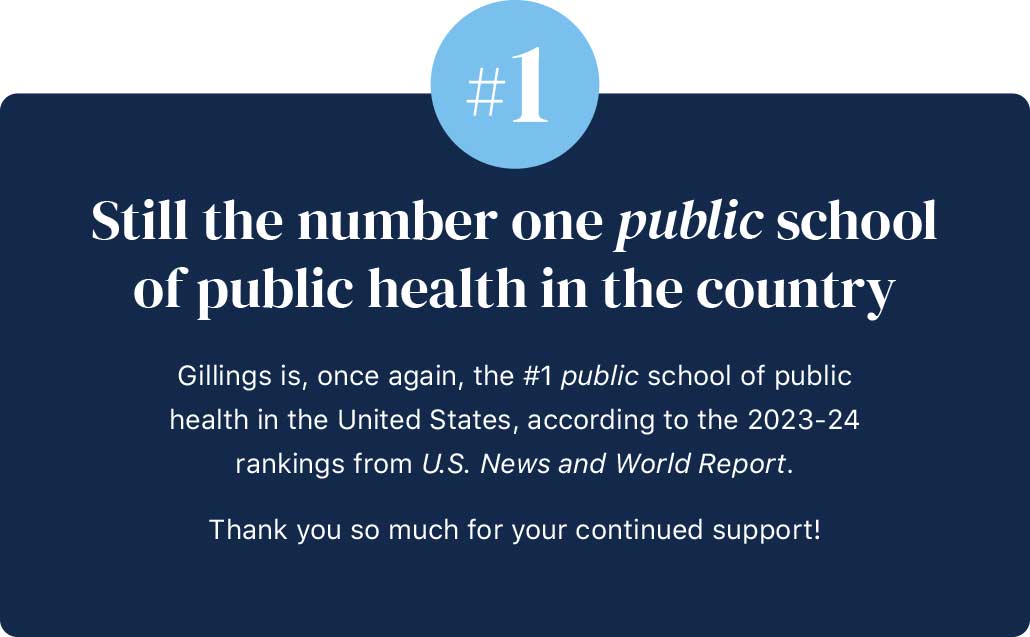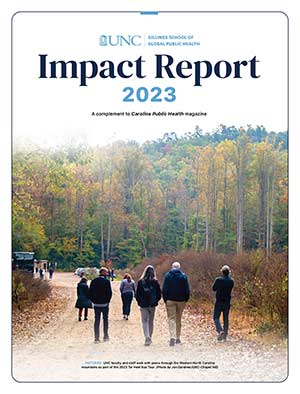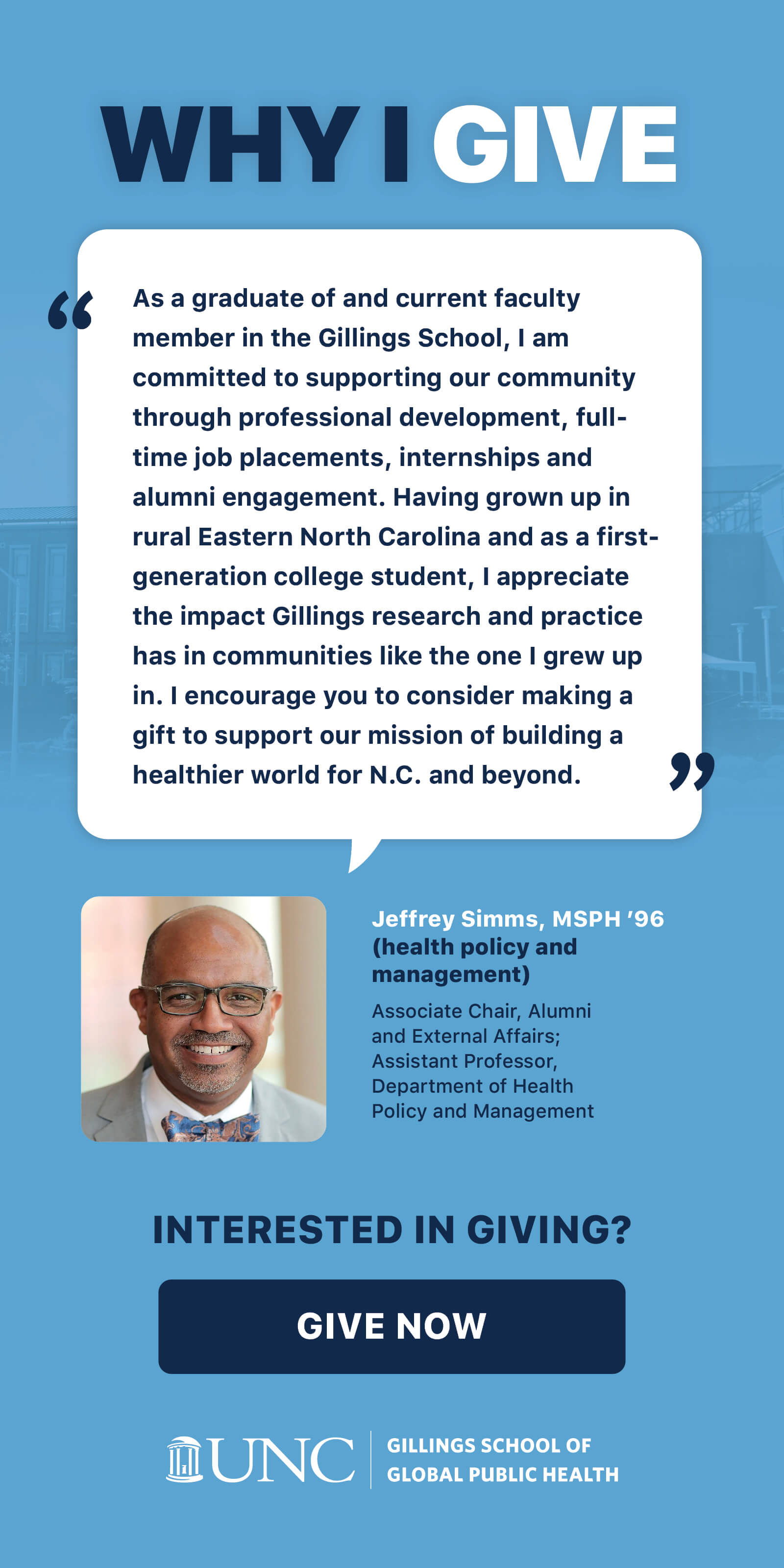Clean air and water: Students reflect on ‘once-in-a-generation’ UN Water Conference
From left to right: Lucy Tantum, Silvia Landa, and Hanna Brosky
UNC Gillings students reflect on key insights from the UN Water Conference, emphasizing global water challenges and the importance of sustainable solutions.
The first United Nations (UN) Water Conference in almost five decades represented a once-in-a-generation opportunity for international cooperation around management of a resource that the UN’s secretary general, António Guterres, referred to as “our world’s lifeblood.” A group from the UNC Water Institute attended, including three students of the UNC Gillings School of Global Health who share their experiences below.
The conference, co-hosted by the Netherlands and Tajikistan, brought the global water community together on March 22-24 in New York City with the aim of understanding, managing and taking action toward shared water goals. Attendees tackled five themes: Water for Health; Water for Sustainable Development; Water for Climate, Resilience and Environment; Water for Cooperation; and Water Action Decade.
In the face of inevitable pressures from urbanization and global climate change, among other factors, organizers envisioned the UN 2023 Water Conference as a catalyst for progress toward the UN’s 17 Sustainable Development Goals, adopted by member states in 2015 as a “shared blueprint” for international cooperation that prioritizes the health of people and the environment. Safe water and sanitation are vital preconditions for efforts to promote health, adequate nutrition, gender equity, education, industry and the environment.
Three doctoral students in the UNC Gillings Department of Environmental Sciences and Engineering attended the conference and reflect on their experiences and takeaways from this landmark event.
Hanna Brosky: Water is everyone’s business.
“As a doctoral student with a deep interest in water engineering, I was eager to attend this conference to gain a better understanding of the global state of water, meet experts in the field whom I respect, and listen to agenda items for the future generations of water researchers and engineers to uphold. The UN in New York City opened its doors to the global water champions, and its seats filled with indigenous representatives, UN delegates, country diplomats and leaders, and spokespeople for both nongovernmental and government organizations. I listened to many delegates of low-income countries discuss problems with affordability of water services and securing appropriate solutions that are not only for developed societies. I heard a focus on putting action to local challenges and the importance of concentrated, systematic solutions that would be inclusive to all, especially women, children and marginalized people. The closing plenary ended with a statement reinforcing how critical it is to include water in all government priorities and the assertion that ‘water is and should remain everyone’s business.’ I left the UN conference having witnessed the world fighting these wicked problems in water, and I am excited to get to work.”
Silvia Landa: Commitments to the Water Action Agenda
The UN Water Conference brought together various stakeholders to generate voluntary commitments and catalyze actions on water-related issues. Participants discussed various issues, shared key lessons, proposed strategies and made commitments to the Water Action Agenda. My research is related to government actions, and the conference was of great interest to me because it gave me the opportunity to witness country representatives making commitments at a UN meeting. Some countries made specific and tangible targets whereas others made broader commitments. It was also fascinating to see countries use this opportunity to raise awareness about their specific issues and seek support from other nations. It would be intriguing to evaluate countries’ commitments further to track which ones follow through with their promises.
Lucy Tantum: Prioritizing water as a public health problem
The integration of water development with the strengthening of health systems emerged as a conference priority. As a student in an environmental engineering program that is housed within a public health school, I am already familiar with the ways that the environment intersects with health. Still, it was exciting to see country governments recognize safe water as an essential component of health service delivery. At the UNC Water Institute, I am involved in research to evaluate and improve access to water, sanitation and hygiene services in health care facilities. The UN Water conference led me to consider how my research can support governments not just in developing water infrastructure, but also in improving access to safe and high-quality health care more broadly.
Next steps for the water agenda
The Water Action Agenda, with over 830 commitments, is a global pledge for a water-secure world, and we believe our research can aid governments in their water and health initiatives. Upcoming UN events will build on the conference’s outcomes.
Discussions from the UN Water Conference carried on at the UNC Water Institute’s 14th annual Water and Health Conference in October, where more than 2,200 stakeholders, not just governments, exchanged insights and strategies for their water and health commitments.
NOTE: The UNC Water Institute recently completed its 14th annual conference October 23-27: waterinstitute.unc.edu/wh2023
Our 3 pillars for a healthier future
We strive toward a future where health is a universal right and the planet we call home is safeguarded for generations to come. In our pursuit of a healthier world, we’ve established three essential pillars to illustrate how we meet our mission.
- Preparedness: We aim to prevent crises; craft strong, empathetic health messages; support an immediate response to emergencies; and work with communities through their full recovery.
- Clean air and water: We study the systems, structures and pollutants that pose a threat to health, invent scalable solutions, and collaborate with leaders to create sustainable change.
- Healthy families and communities: We research chronic illness prevention, address health inequalities and curb harmful behaviors with population-level strategies.





